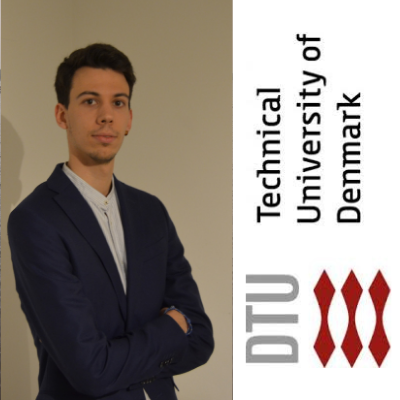
ESR 5 – Bio-succinic production from TPB-2nd phase biogas and AD-biorefinery residues
Host – Technical University of Denmark
Succinic acid (SA) is commonly produced from petrochemicals. When SA is produced via fermentation, CO2 is consumed. The unique process developed by DTU integrates biogas upgrading with SA based-fermentation, whereby gaseous CO2 provided from biogas and carbohydrates will be provided directly from pressed grass/seaweed are converted into two products: bio-methane (CH4>95%) and bio-SA (green building block). Additionally, ensiled grass/seaweed produced by TPB’s 3rd phase reactor will be used as alternative carbohydrate source for bio-succinic acid production.
Initially based at DTU under the supervision of Prof. Irini Angelidaki and Dr. Merlin Alvarado-Morales, Francesco will:
- Develop and validate at lab-scale, an efficient conversion process to produce bio-SA from gaseous CO2-rich streams and sugar-rich hydrolysates (produced from pressed grass and seaweed), using Actinobacillus succinogenes 130Z as the fermentative organism,
- Screen for a more robust and stable industrial organism which will be more suited to the needs of the TPB,
- Perform microbial strain improvements whereby a novel process technology and novel CO2 supply system for enhancing conversion efficiencies of the fermentation-based processes, will be implemented and tested at lab-scale,
- Go to Avecom (Belgium) for a secondment under the supervision of Prof. Verstraete, to learn about their manufacturing and production practices whereby insights into their applicability to the bio-SA bio-methane production processes can be obtained.
I’m Francesco, from Italy. I studied environmental science during my BSc and my MSc degrees at the university of Padua, Italy. My passion for nature developed during these years where I got the great chance of learning the biological and chemical processes of our planet. I’m prepared in the strategies aimed to fight against climate change at different levels. In particular, I decided to better investigate the microbial world and therefore I chose to specialise myself in it.
I worked on my MSc thesis in collaboration with the University of Copenhagen. Here I studied and tried to mitigate the production of methane (CH4) from rumen fermentation to reduce its impact on global warming. This experience confirmed my interest in the research field and I therefore decided to be part of it. What better occasion than the AgRefine ITN project?
Hobbies and passions: Climbing, hiking, basketball and good music in company.
Favourite place: The most beautiful and peaceful place to me is the top of a mountain. No matter the sun, rain or snowy conditions or how long it takes to reach the top. Dolomites in Italy always give wonderful views, especially at sunset or sunrise.
Favourite quote: “Don’t ask yourself what the world needs. Ask yourself what makes you come alive and then go do that. Because what the world needs is people who have come alive.”
(The little Prince – Antoine De Saint-Exupéry)
